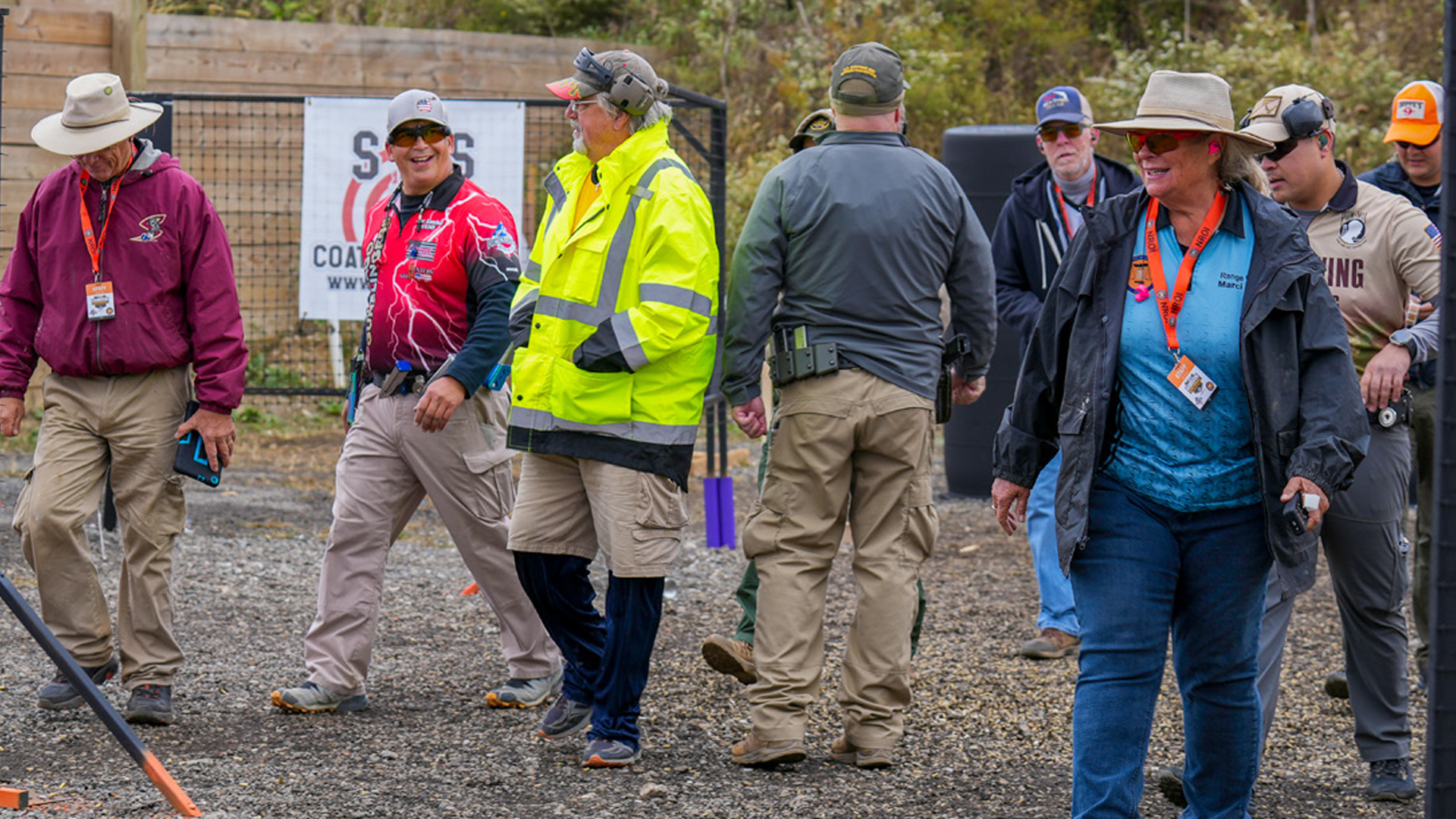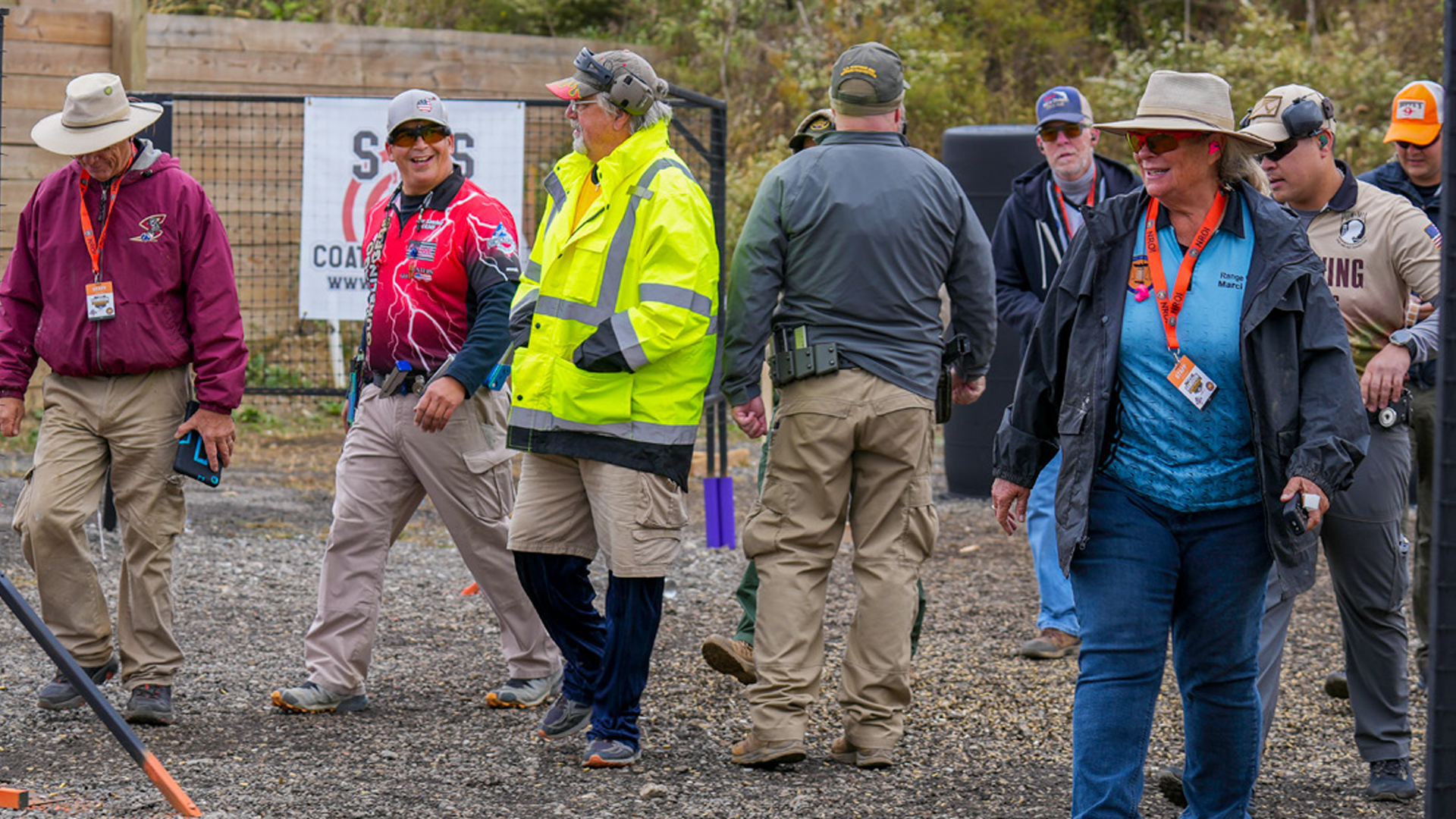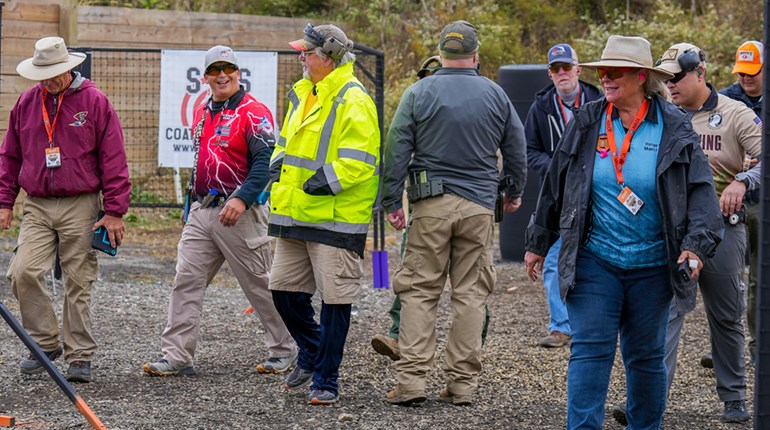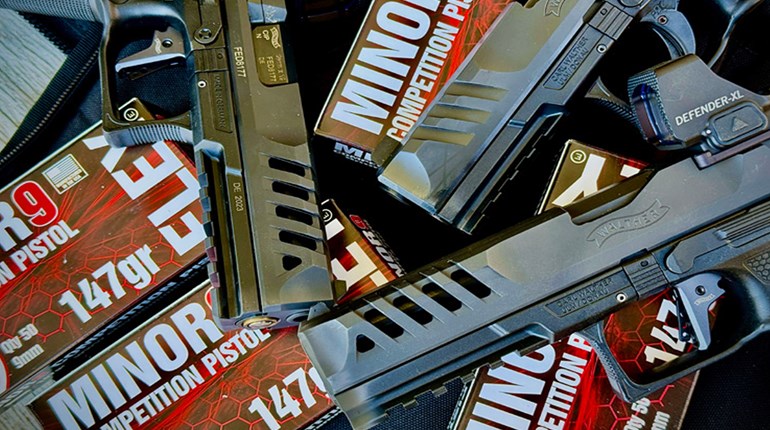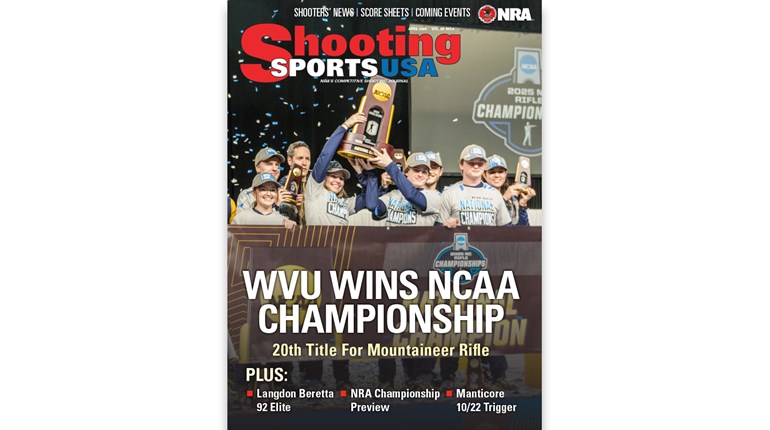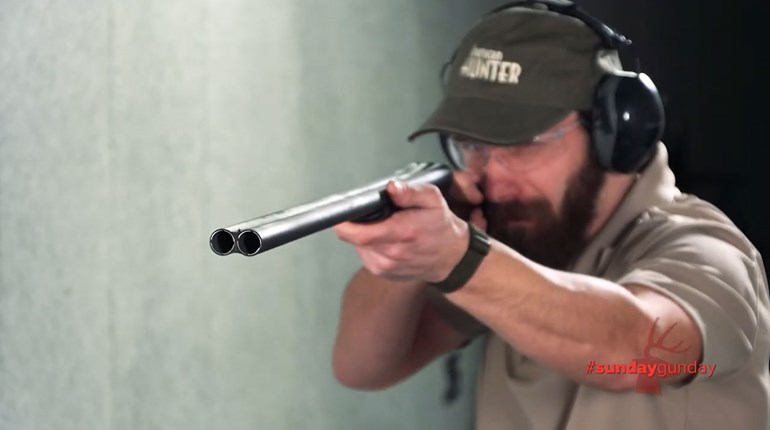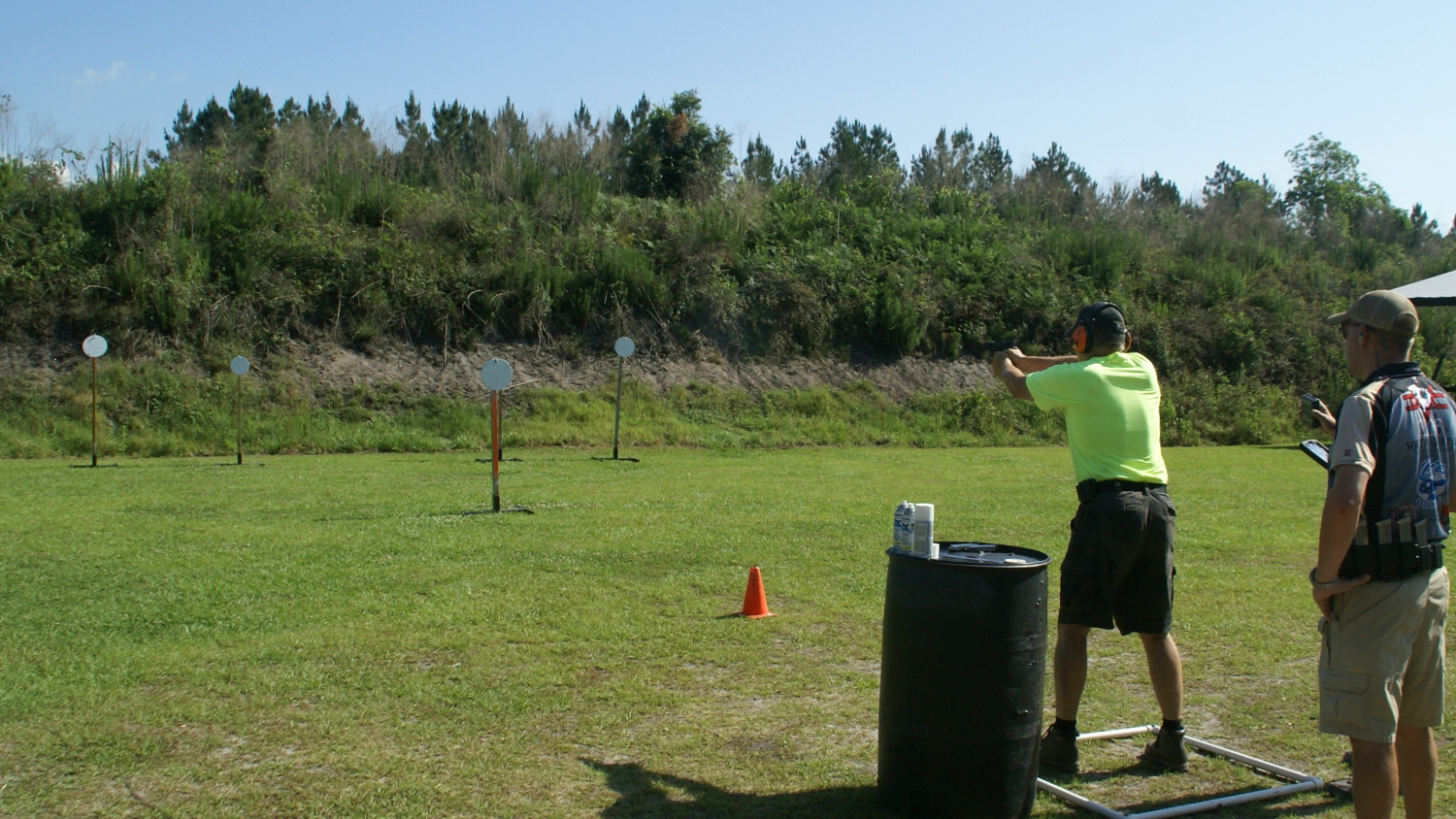
Above: In Steel Challenge, speed is important—but when the 10 and 12-inch plates are out at 20 yards it must be matched with accuracy.
There's a certain primordial sense of satisfaction when the 'Bang' of the gun is immediately followed by the 'Ting!' of the bullet smacking a steel target. That's one reason why shooting galleries are popular at many carnivals and county fairs.

Action pistol shooters also love steel targets, but they are normally just minor additions to the scored paper targets that comprise the bulk of any match. For those who relish a steady stream of 'Bang/Ting!’—consider Steel Challenge.
Steel Challenge (USPSA.org) is an international organization that's rapidly gaining favor with many smaller gun clubs. In fact, from my northeast Florida home I can currently shoot several Steel Challenge matches each month and the most distant club is just a 1 1/2-hour drive. A quick check of the Steel Challenge website can find a club near you.
All about Steel Challenge
The allure is easy to understand. There are eight different stages that are exact in their measurements and will be the same wherever a shooter encounters them. They consist of metal targets (painted white and re-painted after each shooter) set on top of posts. The targets are either 10 or 12-inch round metal plates or 18x24-inch rectangular plates. The 18x24 plates may be encountered anywhere from seven to 35 yards, while the round plates are set at seven to 20 yards. The targets do not fall when hit. The shooter engages them from one spot and merely has to hit them (hear the 'ting!') and leave a bullet strike mark anywhere on the freshly-painted plate.
As a plus, Steel Challenge requires no movement with the gun. All shooting is done from a shooting box. That makes it an excellent venue to introduce junior shooters to competitive shooting. At local club matches a coach or mentor can stand right next to them while they shoot.
Each stage consists of five plates. Four are the initial shoot targets and can be engaged in any order the shooter chooses. The fifth plate is clearly marked as the Stop Plate, and must be shot last. All strings are timed on an electronic timer and once the Stop Plate is hit that string is over.
Scoring is simple and immediate—your time plus any penalties. Shooters will have 30 seconds to engage the five targets and are allowed to reload to continue to engage if needed. A missed target is a three second penalty if it is not re-engaged and hit. If the Stop Plate is missed, and not re-engaged and hit, the shooter's score will be 30 seconds for that string. Savvy shooters will reload if needed to hit the Stop Plate!
Shooters will run five strings on each stage. The best four are scored—allowing the shooter one 'throwaway' run. A normal club match consists of six of the eight stages with a minimum round count of 150 rounds. It's a simple game to play and just about any handgun shooter can play it.

Centerfire handguns require a minimum caliber of 9mm or .38 Special and there is no required Power Factor for the loads used. Gun divisions include pistols or revolvers with optical or iron sights. Centerfire guns begin each string from a holster, with the shooter's hands visible above the shoulders in what is commonly called the “Surrender Position.”
Rimfire handguns (.22LR only, pistols or revolvers) are also divided into optical or iron sight categories. Rimfire handguns start from a low ready position. Rimfire rifles (iron sights or optics) are also allowed and start at low ready.
A recent addition is Pistol Caliber Carbines (PCC). Shoulder stocked carbines in 9mm, .357 SIG, .40 S&W, 10mm and .45 ACP are now allowed with iron sights or optics, and will start from the same low ready position as rimfire rifles.
Speed wins in Steel Challenge. Fractions of a second count! A shooter who successfully hits five plates in 3.58-seconds may feel they've done well—until they watch another shooter run them in 2.58. The numbers on the score sheet look big. But, in reality, it is only a one-second difference—a casual ‘blink of the eye.’
Tips for Success
Shaving even fractions of seconds is the key to winning in this game. Here are three proven tips to help shooters reduce their times.
1) Master the draw and first target presentation. Centerfire shooters start with the gun holstered and the wrists held above their shoulders. That's an awkward draw position. It needs to be practiced.
Rimfire shooters, whether rifle or pistol, start at a low ready position aimed at a stake with a red flag on top, or an orange cone. Align on the top, not on the bottom of the stake or cone. It's less gun movement to the target. Practice moving the gun smoothly to that critical first target.
2) Focus the eyes on the first target. Whether starting from a holster or low ready, once the start position is assumed turn your head and lock your eyes onto the first target you will engage. From either start position the gun will then come to where your eyes are looking. If you are looking down range (or at your gun in the low ready) you'll have to hunt for that first target. This one tip can shave a half-second, or more, on your first target hit!
3) Plan your strategy. You will make five runs per stage with the best four being scored. Don't go crazy on the first run, because if you blow that one you will have to shoot the next four runs conservatively. Instead, shoot the first three runs with your normal rhythm to get three solid scoring runs. You can then accelerate that established rhythm on the last two runs.

These tips can shave time from your overall score. Even if it's only one-half second per run it makes a big difference. In a six stage match there are 24 scored runs. Trim a half-second from each and that 12 seconds in the overall score can be huge!
How fast can that steel be rung? Here are some of the fastest times recorded in the men's centerfire divisions for each of the eight stages—with the total time of the best four runs in seconds and the average time per run.
- Pendulum: 9.81 seconds (2.45 average)
- Roundabout: 7.75 (1.93)
- Showdown: 7.90 (1.97)
- Five To Go: 9.58 (2.39)
- Speed Option: 9.73 (2.43)
- Smoke & Hope: 6.86 (1.71)
- Outer Limits: 11.14 (3.71)
- Accelerator: 8.94 (2.23)
That's fast work from the holster! Any shooter who can get within one second of those average times per run is shooting very well. But, shooters won't discover just how well until they take the Steel Challenge.

